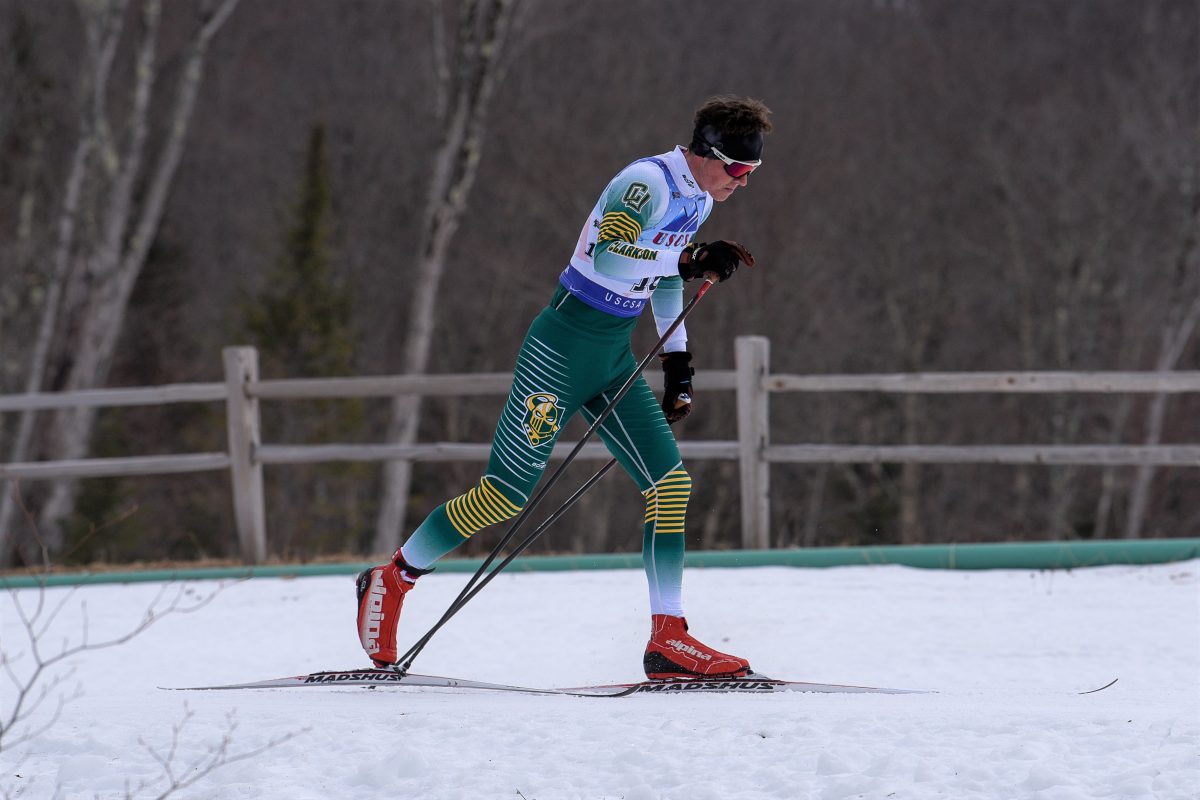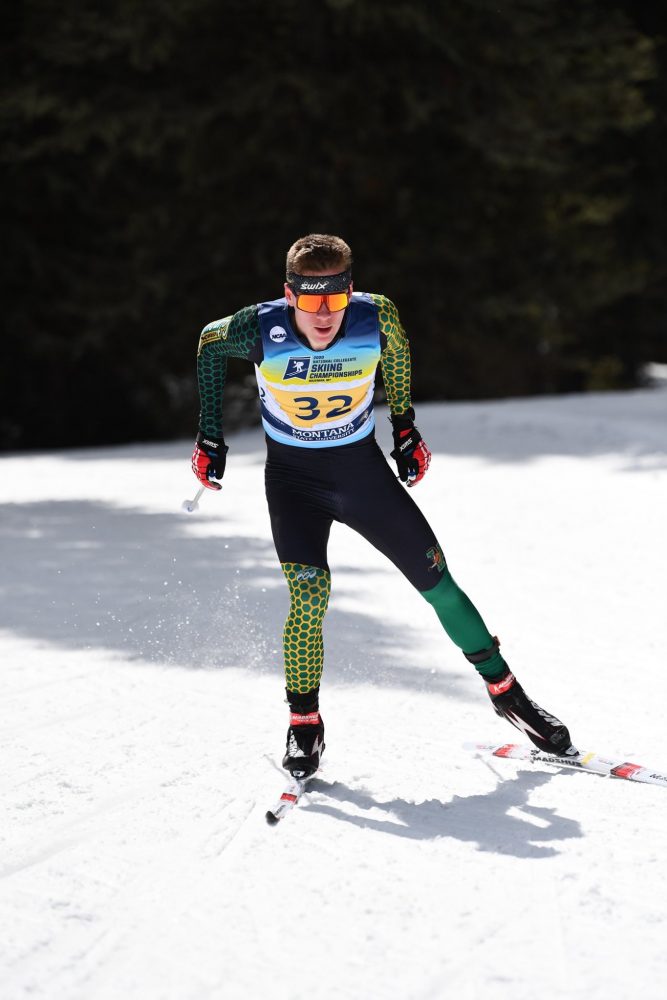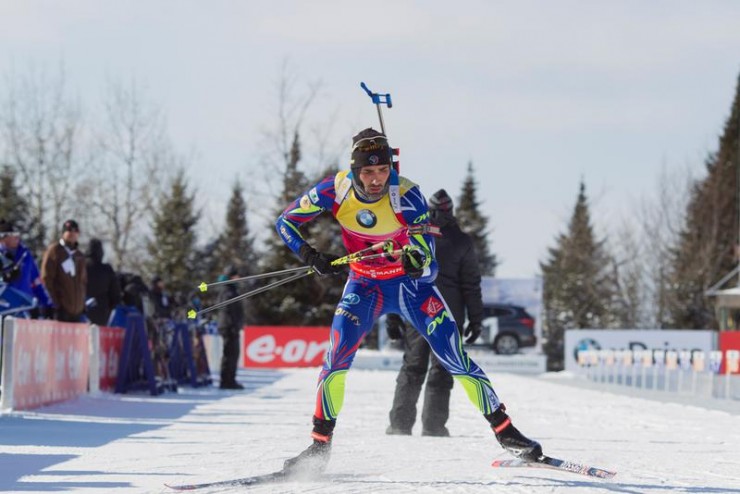
The same three athletes who stood on the podium after the International Biathlon Union (IBUo) World Cup sprint on Thursday in Presque Isle, Maine, did so again after the men’s 12.5-kilometer pursuit on Friday, only their order had changed.
In cold and windy conditions, France’s Martin Fourcade took the victory in 31:04.4, with two penalties in the four shooting stages. The third starter, Fourcade finished 24.8 seconds ahead of Norway’s Johannes Thingnes Bø, who had won the sprint and thus started the pursuit first with a 28-second head start. Russia’s Anton Shipulin started second and ended up third (+1:11.5) with two penalties.
American Tim Burke moved into fourth place on the penultimate loop, but two misses in the final standing shooting set him back to seventh, and he kept that position to the finish, placing seventh and 2:04.9 behind Fourcade with three total penalties.
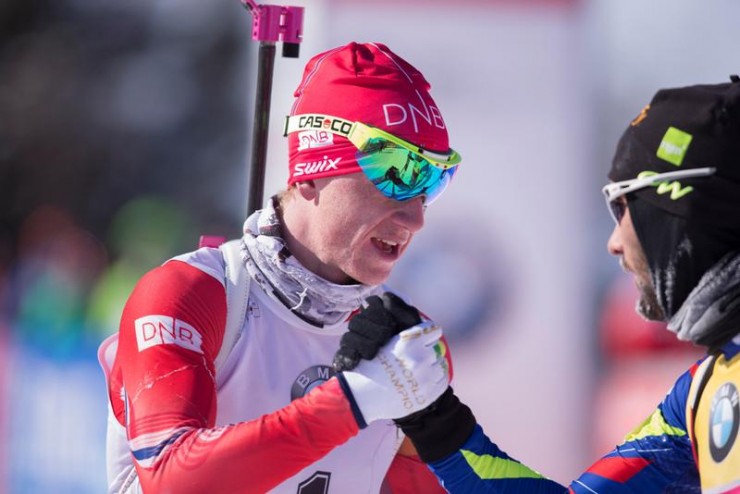
“Today I joined Raphaël Poirée with the number of World Cup wins,” Fourcade said of his 44th victory in a post-race interview with the IBU. “That means a lot for me. I grew up watching Raphaël on TV. To join legends you need to [be] inspired, and I know how much he inspired me.”
Asked if he feels like a legend himself now, Fourcade laughed: “No, I will never do. I just try to do my best.”
Poirée represented France on the World Cup from 1995 to 2007. He earned both silver and bronze at the 2002 Olympics in Salt Lake City, Utah, and another bronze in the relay at the 2006 Olympics in Turin, Italy, as well as 20 medals at World Championships, seven of which were gold.
Unfortunately the end of the pursuit was overshadowed by a severe crash from Germany’s Arnd Peiffer, who had left the shooting range in 11th position, then fell on a downhill section on the final loop. At high speed, Peiffer came off the right side of the course without another athlete nearby, ripped through a safety net, and crashed head and shoulder first against a thinly padded group of trees. He later could be seen on the TV broadcast sitting upright leaning against the trees, with his skis and rifle removed by coaches and course staff. He was then strapped to a stretcher and put in a neck brace as a precaution, and taken to a nearby hospital.
“I saw the immediate aftermath of the crash,” American Lowell Bailey, who had left the range shortly after Peiffer in 15th, wrote in an email. “Arnd was off the side of the trail, just following a severe 180-degree turn. The turn is tight and there is little room for error. The outside of the turn was lined with mesh snow fence and all I could see were his feet sticking up onto the trail.”
“There was a lot of blood in the snow,” Germany’s assistant coach Andreas Stitzl, who was one of the first responders sprinting to the accident site, later told German TV broadcaster ARD. Stitzl suspected that Peiffer had, at a minimum, sustained a concussion and lacerations on his mouth and forehead. “I was completely shocked how he was lying there. The most important thing was that we first stabilized his head,” Stitzl said.
ARD later posted an interview with German team doctor Klaus-Jürgen Marquardt, who confirmed that Peiffer had suffered a severe concussion, but remained conscious and could remember the crash despite some loss of short-term memory about the morning of the race. Further evaluations still had to determine other injuries, but Peiffer reportedly was able to call his family at home.
No Athlete Unscathed in Four Stages
Wind conditions gave the entire 60-man field problems during the pursuit, with stronger gusts than they had experienced during the “zeroing” target practice immediately before the race. As a result, competitors either had to adjust their sights or wait for a calmer moment.

Penalties quickly started to pile up and separated the field. Bø, Shipulin and Fourcade all missed one in their first prone stage, but kept the positions they had held at the start.
In the second prone stage, Bø and Shipulin managed to stay clean, while Fourcade had another penalty and for a while, fell back to fifth place behind Germany’s Erik Lesser and Latvia’s Andrejs Rastorgujevs, who hit all 10 of their targets between the two prone stages.
In the next standing stage, Bø shot fast and clean a second time, despite having to reset his position before the third shot, and headed out on the fourth loop with a 44-seconds lead. Fourcade also cleaned to improve t0 second place again entering the loop, with Shipulin also staying clean and leaving the range in third.
In this stage, Lesser missed two and Rastorgujevs missed three to fall out of contention. They went on to place 13th (+2:42.8) and 21st (+3:21.7), respectively. Switzerland’s Serafin Wiestner, who had finished a career-best fifth in the sprint the day before, even “dirtied” his standing targets, incurring the full five penalties, and went on to finish 27th.
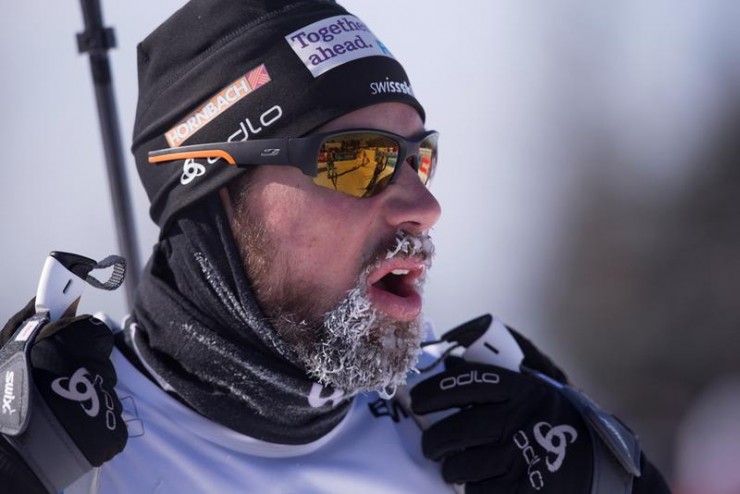
In the last standing stage, Bø entered the range still in first, but this time, he missed two while Fourcade as the closest pursuer was able to clean his targets.
“When I came to the last shoot, I though ‘OK, don’t look at Johannes’ targets’,” Fourcade told the IBU. “At the last moment, my eyes decided to look at it. My body and brain didn’t want to, but my eyes just looked at the targets. And I saw that he had two mistakes. So I thought ‘OK, you can do it.’ ”
Fourcade left the range 7.9 seconds ahead of Bø in second, and Shipulin moved into third (+47.3) after also missing one — his second penalty of the day.
On the last loop, Fourcade increased his lead over Bø to more than 20 seconds with 1 k remaining. He went on to finish 24.8 seconds ahead of the Norwegian, and Shipulin secured third place (+1:11.5).
“It was a day of statistics,” Fourcade said at the press conference when told it was his 100th day holding the yellow bib of the World Cup leader, and matched the number of victories of his countryman Poirée. “I love statistics, even if I’m not fighting for records. And this means a lot to me.”
“Second position is nice, but I always want to win,” Bø said at the press conference. “I was in the lead all the way until the fourth shooting. I felt the wind came strong and my legs were a little bit tired, then I missed two.”
“When I was racing in the penalty loop I watched Martin hit all the targets. That was really boring,” he added with a laugh.
“I would say my success was about average,” Shipulin said of his overseas trip to North America, through a translator. “I had three podiums here. I can’t say I am in my perfect form yet. Actually it was more of a training World Cup period than a competitive one, so I am satisfied… I now plan to train hard and compete as best I can at World Championships.”
Fourth place went to Austria’s Simon Eder (+1:39.7), with three penalties, who improved from 11th after the sprint, but potentially missed a chance to move onto the podium with a miss in his last standing. He left the range for the last time 45 seconds behind to Shipulin and ended up 28.2 seconds off the podium.
“The wind situation was extremely difficult,” Eder said in an Austrian Skiing Federation press release. “In the first standing shooting I waited forever until the wind calmed down. Then I quickly shot right through it. For the last standing position it just would not calm down. Then I tried to hit shot by shot. For the last one it did not work out anymore…. Of course I am very happy about the fourth place.”
Burke, 7th, Leads Three Americans in Top 20
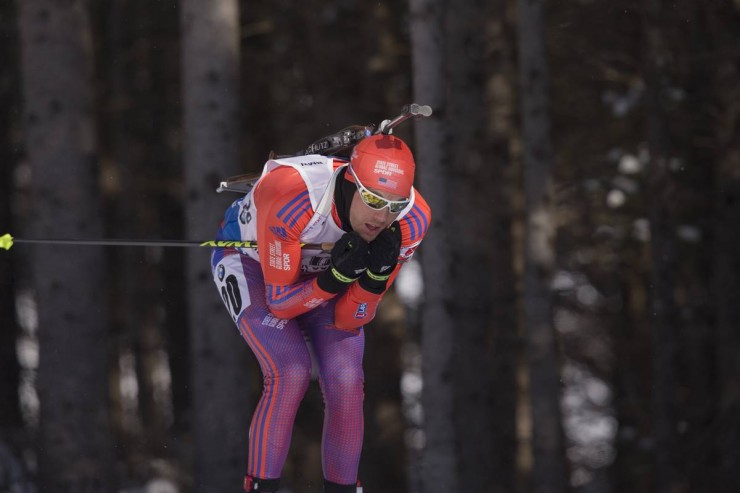
Just as it had done in the sprint, U.S. Biathlon ended up with three men in the top 20 in the pursuit. Similar to the men on the podium, the three Americans finished in a different order than on Friday.
The latest starter of the three in 20th, 1:33 minutes back based on his sprint finish, Burke raced into contention in the pursuit — putting himself in fourth with a chance at the podium. He incurred more penalties in the final shooting than those ahead of him, but still finished seventh (+2:04.9) with three penalties (1+0+0+2). Last week in Canmore, Burke also placed seventh for a season best in the mass start.
“I’m really happy with the race,” Burke told FasterSkier on the phone on Friday. “That was a great, great performance for me. That was really really tricky shooting conditions again on the range. I felt like I handled it pretty well, so I am really pleased with the result.”
“The real key to my race today was that clean first standing stage,” Burke recalled. “There I moved from 11th and I went out basically was 4th place after that. Definitely a tricky stage, it was really windy, but I just took my time. I refused to just give away a shot. I really fought for every shot there.”
On the penultimate loop, he moved up to fourth place after initially leaving the range in seventh:
“So our next loop there, I went out just behind Erik Lesser and Simon Eder,” Burke said. “I’m pretty sure there were a couple guys right behind me, I don’t know who they were. A little ways in to that loop those guys both pulled over and did not want to lead. So I ended up pulling for the rest of that loop and I felt really good.”
Burke came into the last stage still leading that pack in fourth place, but shot two misses pushed him back to seventh as he left the penalty lap again.
“I was excited for that last standing,” Burke said. “That was a really tough one. It was so windy as we were setting up. I just tried to be really patient, but I just ended up just having to go for it after awhile because I didn’t want to wait for too long.”
On the final loop, he was unable to catch those ahead of him who had passed him with just one penalty in the final stage, but Burke also didn’t lose another position, defending a narrow lead over Bulgaria’s Vladimir Iliev and Ukraine’s Artem Pryma.
“Overall I am really satisfied,” Burke concluded. “Of course I definitely wanted that sixth place to get into the [flower ceremony] awards there at the end. Going out onto the last loop I was just couple seconds behind [Czech Republic’s Michal] Slesinger. I know he’s really tough on the last loop too. We just kind of yo-yoed the whole loop: I’d make up a few seconds then lose a few seconds. Then, in the end I just felt like I was coming back to him pretty good in the last k. But I just ran out of room.”
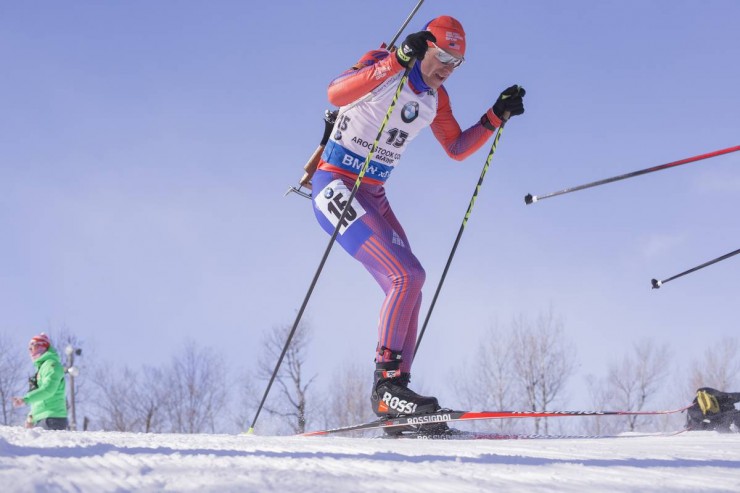
About 40 seconds behind Burke, teammate Bailey finished the pursuit in 14th (+2:43.2) with five penalties (1+0+3+1). He had started the race in 15th, 1:22 behind Bø.
“There was a lot of wind in the shooting range today,” Bailey wrote in an email. “The venue is situated on top of a plateau and the prevailing winds come ripping across the range. Usually, the wind is from left to right, but today it was fickle, and changed dramatically from one stage to the next.”
Sean Doherty started the pursuit in 13th, 1:16 behind, and with six misses (2+2+1+1), he lost a few positions to finish 20th (+3:05.3). Despite struggling with the changing wind conditions, he was satisfied with his race.
“Although it was not my best shooting, today’s result was in no way bad,” Doherty, 20, wrote in an email. “It is still my third best world cup result and I am happy with it.”
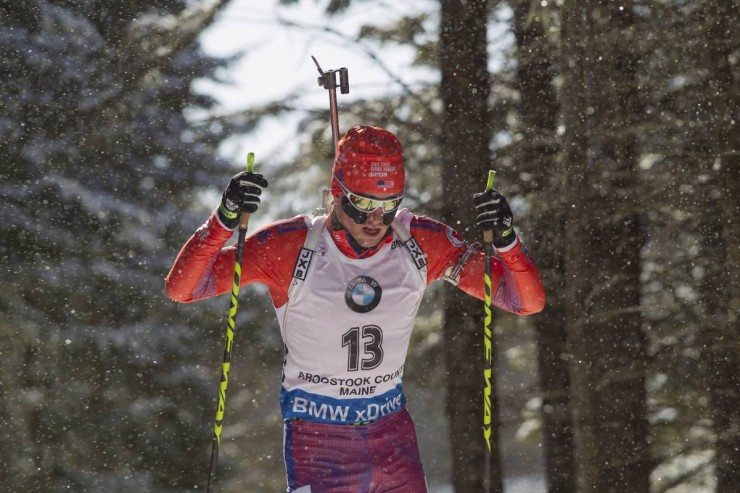
“Today for our race the wind picked up,” he explained of the shooting conditions. “It was much stronger than in zero by the time the race started. Overall it was challenging conditions on the range, but the tracks were in great shape.”
Without Biathlon Canada’s A-team at the races in Presque Isle, Scott Perras was the only Canadian who had qualified for the men’s pursuit, starting in 48th place. After a clean first shooting, he fell back in the subsequent stages, and ultimately finished 47th (+6:17.4) with seven penalties (0+2+3+2).
“The shooting conditions were pretty tough today,” Perras wrote in an email. “In zero, the wind flags would show very little wind close to the shooting mat, the flags closer to the targets were showing the truer shooting conditions. It was manageable at times but no one was given a free hit out there today, you had to work for them.
“The skiing felt ok, my legs should feel better but it takes a while to get used to the speed of the World Cup and it doesn’t happen over a weekend,” the 32-year-old Sochi Olympian added. “I was much happier with my skis today, and everything seemed a little better than in the sprint.”
Baby It’s Cold Outside
The night before the pursuit, temperatures in Presque Isle dipped to minus 21 degrees Celsius (-6 Fahrenheit). By the start of the race at 11:30 a.m. local time, the rising sun had warmed the temperature in the Nordic Heritage Center arena to a more manageable minus 16 Celsius (3 Fahreheit), according to the IBU race report.
On Thursday, an already-cold J.T. Bø told NRK about losing feeling in his fingers during the sprint.
During the pursuit, he appeared to be wearing the same gloves again, and swirled his arm several times before the shooting stages in an effort to increase blood flow in his shooting hand.
“Actually I think it’s a little colder than in Norway today,” his teammate Erlend Bjøntegaard, who skied to fifth place (+1:57.6) told the IBU. “I was just ready to attack today, and that’s what I did.”
He suspected his fifth-place result would help him to secure a spot on the Norwegian team for the upcoming World Championships in Oslo.
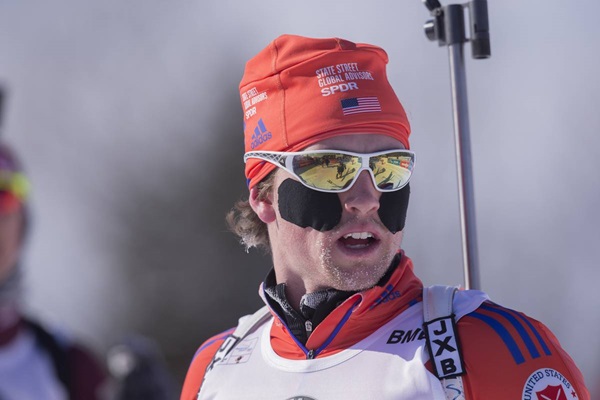
The winner, Fourcade could be seen wearing a breathing mask before the race to warm up the cold air.
“It was really not easy because it’s a long time since we have raced in this kind of conditions,” Fourcade commented on the race condition during the press conference. “For me it was really difficult. My left hand froze during the competition; luckily I shoot with the right hand. I think this was the limit with the wind where the body can react well to the cold.”
After the race, he decided to skip the relay and expected colder temperatures on Saturday, and flew home to France on Friday.
According to some athletes, the temperatures — the coldest they had raced in this season — weren’t a problem.
“We are from Russia so this is quite normal and comfortable for us,” Shipulin said with a smile in the press conference, through a translator. “We were training before this in Yakutia [a region in the far east of Russia], where minus 17 Celsius [1.4 Fahrenheit] is considered warm temperature. … I rather had too [many] clothes on me today.”
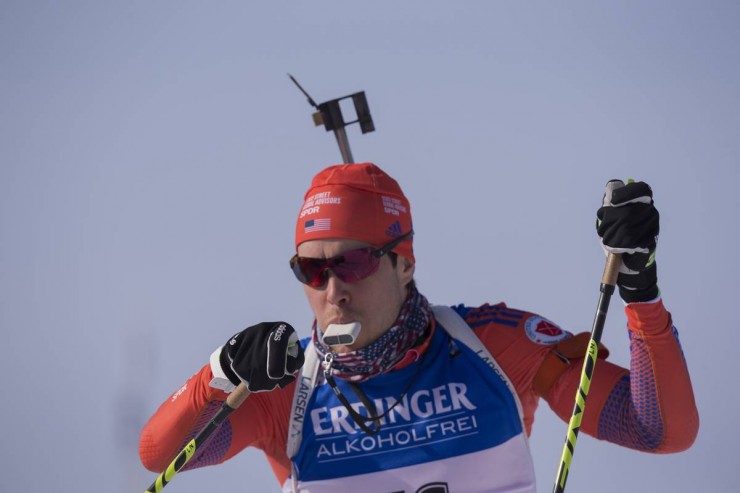
“Many Europeans [are] using breathing masks to warm up or train in temperatures many North Americans would consider mild,” Perras wrote. “Today was definitely warm enough that you weren’t going to hurt your lungs, but it was important to keep skin from being too exposed. I wore slightly thicker gloves in the race but decided to remove my right glove for the final standing shooting, I wanted a better feeling on the trigger. I knew that my hand would stay plenty warm for the last lap of the race even without my glove.”
“I was prepared for it,” Burke said of the frigid temperatures. “I knew there would be a good chance it would be really cold up here, so I packed all my best warm weather racing gear. I felt fine in the cold. The only part I struggled with was my hands, especially on the first loop. That first prone, I let that shot [that I missed] go without even knowing it. I just quickly pulled the trigger. After that, my hands warmed up and they were fine for the rest of the race.”
“Racing in the cold like this adds an extra bit of challenge,” Doherty explained. “It is tough on the hands, to keep them warm enough, and it adds a bit of extra stress and demand on the system. But luckily the weather is the same for everyone and you just have to work with it.”
“After growing up in the Northeast as a ski racer, I think you just learn to accept the discomfort that arises on a day like today,” wrote Bailey, of Lake Placid, N.Y. “I warmed up with a lot of extra layers so that I was as warm as possible before stripping down for the race. During the race, I lost feeling in all of my fingers except my trigger finger… It sounds odd, but for some reason, my index fingers seem to stay frost free, while I typically lose all feeling in the rest of my fingers on a day like today. But, it’s the same conditions for everyone … You just have to go out and make things work.”
Relays on Saturday
Later on Friday, organizers announced that the women’s relay would be moved from Sunday morning to Saturday at 4:10 p.m. Eastern time after the men’s relay at 2:20 pm, fearing even colder temperatures on Sunday could otherwise lead to a cancellation.
“All of us are very excited about the relay,” Burke said of his 4 x 7.5 k relay team, with Bailey, Leif Nordgren, him, and Doherty racing in that order. “I mean, two races in a row here with three guys in the top-twenty, I think [that] shows the kind of depth our team has. Coming off of two solid results, we are looking forward to this one.”
Note: In the women’s 10 k pursuit, Susan Dunklee started second and finished fifth for her second-straight flower ceremony in Presque Isle, and the U.S. women had three in the top 25 with Clare Egan in 23rd and Hannah Dreissigacker in 24th. Canada’s lone starter in the pursuit, Zina Kocher placed 46th.
“I think today was one of the women’s team’s best days ever,” Dunklee said. “Having three ladies in the top 25 is huge. It is going to be a fun relay and we have the potential to put together a great performance.”
Stay tuned for a separate report on the women’s race.
Watch the men’s and women’s relays live on Eurovision (Friday at 2:20 p.m. and 4:10 p.m. EDT)
Harald Zimmer
Harald has been following cross-country skiing and biathlon for some 20 years since the Olympic Winter Games in Albertville and Lillehammer. A graduate of Middlesex University London and Harvard University, he now lives near the Alps where he likes to go skiing, snowboarding and hiking. He is a former track athlete in middle-distance running, as well as a huge NBA fan.


